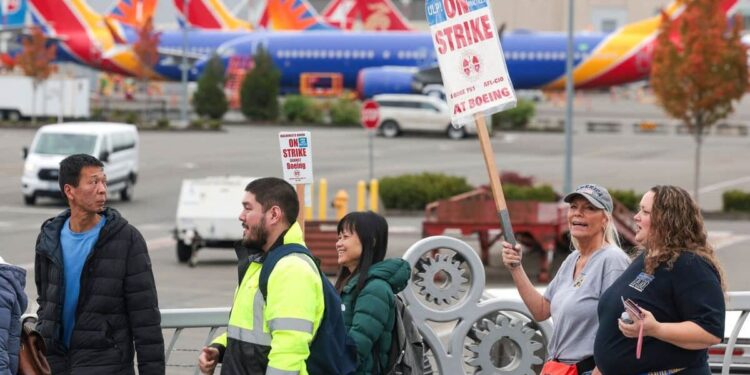Boeing employees in the American region of Seattle largely rejected on Wednesday the latest draft social agreement proposed by the aircraft manufacturer and renewed the strike which has paralyzed two crucial factories since mid-September, a union said.
• Also read: The year 2024, a series of strong turbulences for Boeing
• Also read: Agreement in principle between Boeing and its workers
• Also read: Boeing, in financial difficulties, will cut around 17,000 jobs worldwide
Nearly two thirds (64%) of members of the local branch of the machinists’ union (IAM) spoke out against the project, the IAM communicated on the social network X.
Boeing’s latest offer envisaged a salary increase of 35% over four years, but without restoring the retirement system abolished in 2008 that many employees demanded.
Some 33,000 workers around Seattle, in the northwest of the United States, where Boeing was born in July 1916, have been on strike since September 13 in the group’s two main factories, producing the 737 (its best-selling plane ), the 777, the 767 and several military programs.
This strike was voted on following the rejection of a draft company agreement presented on September 8 and deemed insufficient.
The IAM demanded a 40% salary increase to make up for the delay in salaries compared to inflation in recent years, not allowing employees, they explain, to be able to live properly in this region. among the most expensive in the United States.
“After 10 years of sacrifice, we still have reasons to catch up” this delay, declared Jon Holden, president of the local branch IAM-District 751, saying he hoped to “resume negotiations quickly”.
The decision is an illustration of “democracy in the workplace, and also clear evidence that there are consequences when a company mistreats its workers year after year,” Mr. Holden added.
The extension of the strike comes after Boeing published its worst quarterly loss in four years on Wednesday, against a backdrop of repeated accidents and incidents affecting its aircraft.
The company announced a net loss of $6.17 billion, weighed down by heavy charges of five billion in its Commercial Aviation (BCA) and Defense and Space (BDS) branches which it had unveiled on October 12. The FactSet analyst consensus was for $6.12 billion in losses.



